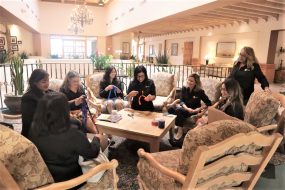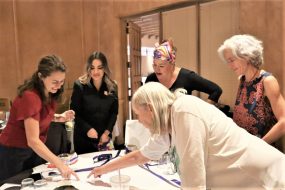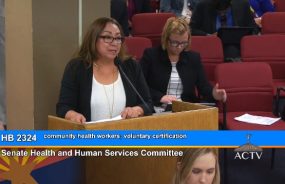University of Arizona Prevention Research Center and Public Health Partners Achieve State Certification Path for Community Health Workers

Community health workers (CHWs) help community members access health services. As trusted messengers, they fulfill a critical role in public health, but a lack of standardized training and formal certification has limited their potential. To address this challenge, the Arizona Prevention Research Center (AzPRC) partners formed a coalition to pursue a pathway to voluntary certification.
Lack of CHW Certification Meant Less Recognition, Compensation
CHWs, also known as community health representatives (CHRs) in American Indian communities and promotoras in Latino communities, have been serving Arizona communities for years. But the state did not have a CHW certification to acknowledge their role in the health care system, resulting in a lack of respect for their profession as well as low compensation and job security. As the number of CHWs grew rapidly and they became more integrated into health programs and initiatives, organizations realized the need and benefit of standardizing their skills and competencies.
CHWs “provide education, navigation, social support,” explains Lorena Verdugo, a CHW in Arizona. “The scope of practice is so essential to those who are suffering from detrimental chronic health conditions.”
AzPRC Research Supported State Certification
For more than 25 years, AzPRC has conducted community-engaged research with CHWs, CHRs, and promotoras. The PRC now has extensive data on the CHW workforce and its impact on chronic disease outcomes.
In 2013, AzPRC began translating its research into practice by developing standards that reflect the specialized skills of CHWs, CHRs, and promotoras. The first step was to partner with the Arizona Department of Health Services (ADHS), the Arizona Community Health Workers Association (AzCHOW), and other CHW organizations to establish the Arizona CHW Workforce Coalition. This coalition then developed Arizona CHW core competencies and a scope of practice.
Next, the coalition worked with legislators to draft a bill formalizing voluntary CHW certification. As part of this effort, the coalition developed tools to share AzPRC’s research with decision makers, and they identified sustainable funding mechanisms to integrate CHWs into the health care system.
Voluntary CHW Certification Became Arizona Law

In May 2018, Arizona Governor Doug Ducey signed the CHW voluntary certification (HB2324) into law. HB2324 defines the term community health worker, and the role of CHWs as frontline public health workers who are trusted members of the community. The director of the ADHS is responsible for prescribing the core competencies of CHWs, establishing the minimum education, training, and experience qualifications, and establishing criteria for granting, denying, suspending, and revoking a certificate. The “voluntary” designation means that non-certified CHWs can continue to serve in their community, although they will not be eligible for Medicaid reimbursement. As outlined in the legislation, ADHS established a CHW advisory board to draft rules for governing implementation. Representatives from AzPRC, AzCHOW, and ADHS served on the advisory board and took part in this process. Meanwhile, the CHW workforce coalition reached out to the Arizona Health Care Cost Containment System (the state Medicaid system) to recommend codes and protocols for reimbursement.
The voluntary certification of CHWs officially launched on November 7, 2022. At that time, over 1,000 CHWs were eligible to fulfill the requirements for certification. The ADHS established a CHW Licensing Management System and website with information on licensing, and a checklist to help individuals gather required documentation before completing the online application. Organizations now have a clear mechanism for identifying CHWs who are skilled in their core competencies and can achieve anticipated health outcomes with community members.
AzPRC Promotes Certification and Evaluates Policy Implementation

The AzPRC, ADHS, and AzCHOW created a series of materials to translate evidence into practice and facilitate implementation of the law. These included infographics to share best practices on how to integrate CHWs into clinical practice and CHW curricula. To increase participation, ADHS and AzCHOW also promoted CHW voluntary certification at annual CHW conferences and during webinars.
Since the legislation was passed, AzPRC has been collaborating with partners to define CHW services that can be reimbursed by Medicaid. AzPRC is also ensuring job descriptions and core competencies align with the new CHW roles. ADHS is funding the AzPRC to provide technical assistance to organizations as they prepare and submit their core competency training programs for approval. AzPRC is also evaluating the law to make sure it is implemented correctly, ultimately assessing the law’s impact on the CHW workforce, health care access and community health.

“What CHW voluntary certification brings is the opportunity for a sustainable workforce that can provide services to vulnerable and underserved communities, especially in areas where CHWs have not been integrated into health systems. Voluntary certification ensures continuity of services for our population that allows for better health outcomes.”
Floribella Redondo-Martinez CHW, AzCHOW CEO
The Arizona Prevention Research Center is one of 26 Prevention Research Centers (PRCs) supported by the Centers for Disease Control and Prevention (CDC) for the 2019–2024 funding cycle.